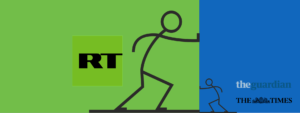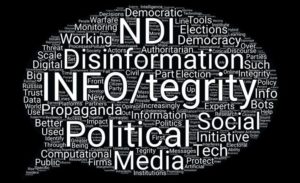 Allegations of Russian interference in the U.S. election are false and “make a mockery” out of American democracy, Moscow’s top diplomat has claimed, Newsweek reports.
Allegations of Russian interference in the U.S. election are false and “make a mockery” out of American democracy, Moscow’s top diplomat has claimed, Newsweek reports.
“[S]urely nobody seriously believes that a restauranteur from Russia, making some such posts on social media, could influence the elections of such a mighty country such as the United States,” Russian Foreign Minister Sergey Lavrov said, referring to Putin associate Evgeny Prigozhin. “The very suggestion of this, in my view, makes a mockery out of the whole U.S. political system, portraying its democracy as a house of cards.”
 A force infinitely more powerful than Russian hackers is at work in the world: the torrent of creative destruction known as the information revolution, argues analyst Walter Russell Mead. From Alaska to Azerbaijan, from Pyongyang to Peru, the internet is disrupting social and business hierarchies, automation is transforming economic life, and social media is changing the way news is produced and shared.
A force infinitely more powerful than Russian hackers is at work in the world: the torrent of creative destruction known as the information revolution, argues analyst Walter Russell Mead. From Alaska to Azerbaijan, from Pyongyang to Peru, the internet is disrupting social and business hierarchies, automation is transforming economic life, and social media is changing the way news is produced and shared.
 Democracies and dictatorships alike are struggling as one of the most consequential and uncontrollable events in global history unfolds in real time, he writes for The Wall Street Journal:
Democracies and dictatorships alike are struggling as one of the most consequential and uncontrollable events in global history unfolds in real time, he writes for The Wall Street Journal:
The global disruption comes at a bad time from the standpoint of democracy promotion. The late 20th century saw a large number of new democracies emerge. Many are still rather fragile. Countries where democratic institutions and values are deeply rooted are likely to ride out the storm—much as British and American democracy survived the Great Depression. Countries with weak institutions and turbulent histories may fare worse as they come under stress from the new forces.
“The real question is not whether Russian black operations can subvert democracy world-wide,” Mead adds. “It is whether democratic societies can harness the energies released by the information revolution without being overwhelmed by the disruption they bring.”
 How do you monitor — and when do you fact-check — online discourse you may not be paying attention to? Poynter* asks. A one-day workshop run by First Draft, a project of the Harvard Kennedy School’s Shorenstein Center, and Poynter’s International Fact-Checking Network (IFCN) will concentrate on monitoring all online platforms for disinformation.
How do you monitor — and when do you fact-check — online discourse you may not be paying attention to? Poynter* asks. A one-day workshop run by First Draft, a project of the Harvard Kennedy School’s Shorenstein Center, and Poynter’s International Fact-Checking Network (IFCN) will concentrate on monitoring all online platforms for disinformation.
*A grantee of the National Endowment for Democracy.







